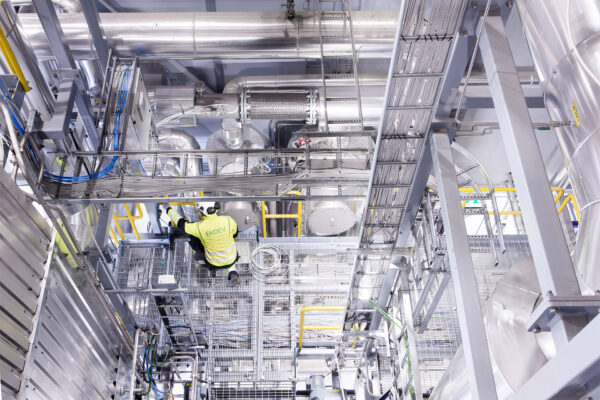Burning water can seem a strange idea. But that is exactly what Endev does when it incinerates waste sludge in the process it has developed. Incineration destroys harmful compounds in the sludge and recovers its nutrients, such as phosphorus, in the ash produced. This also produces energy. A pilot plant is just starting up in Rovaniemi, Finland.
The idea of applying the fluidised bed method commonly used in energy production to treating waste sludge was born in LUT University, Lappeenranta, where the technology has been developed for decades. Endev was established in 2011 to develop and productise a method tailored for sludge treatment. The method is suitable for treating sludge from municipal wastewater treatment plants or, for example, from pulp & paper mills.
“After mechanical drying the sludge contains roughly 75% water. It is then fed into the circulating mass dryer where fluidising warm sand dries it. As the water evaporates, the sand sticks to the dry material of the sludge and carries it to the circulating mass reactor where the temperature is 850˚C. When it burns, the dry material of the sludge yields enough energy to power the entire facility and produces a surplus, too,” Endev’s CFO Arttu Laasonen says.
Surplus energy can be fed into, for instance, the district heating network.
Microplastics and drug residuals removed from circulation
Also harmful contaminants, such as microplastics, traces of pharmaceutical products, and microbes, are destroyed in Endev’s reactor. Flue gases are carefully cleaned.
“Current sludge processing methods, biogas production and composting, don’t remove harmful compounds, so they pose the risk of releasing detrimental elements into the natural environment. Our method produces phosphorus-rich ash that is safe to use and much lighter to transport than sludge,” explains Laasonen.
Plastic is such a new invention that its long-term effects on people and the environment are unknown. Laasonen points out that the same applies to fire retardants and many other chemical compounds that Endev’s technology eliminates from circulation. Resistance to antibiotics is already a well-known phenomenon, so preventing the circulation of pharmaceutical products is good news.
European regulation is guiding development in the same direction as Endev because using waste sludge as an agricultural fertiliser will cease in many countries after a set transition period. It is deemed to be ecologically unsustainable. Purchasers of grain in many countries have already announced that they will only accept grain farmed without sludge.
Phosphorus-rich ash granules a fertiliser of the future
Fine-tuning the method for viable production has taken years, and environmental certification for the Rovaniemi pilot plant was not obtained without a struggle. Laasonen comments that the benefit of slow progress is that meanwhile the market has matured. There is no shortage of phosphorus fertiliser in Finland yet, but many other countries are well aware of the benefits of phosphorus recovery.
“Intensive farming necessitates the use of phosphorus. Widespread transition to organic agriculture is not realistic, because it would require a larger field area. Simultaneously clearing fields, resisting erosion and using forests as carbon sinks is a difficult equation. There is already a shortage of phosphorus, and most of the world’s phosphorus reserves are situated in unstable countries. We offer a solution to this problem,” Laasonen says.
Compared to competing sludge incineration methods, Endev’s facility is small, easily deployable and relatively inexpensive. It does not need support fuel, either, as do plants operating elsewhere in Europe. There are hundreds of cities in Europe of a size that would be suitable for Endev’s sludge processing plant.

Commissioning of industrial-scale facility
Endev tested and refined the technology in its prototype plants in Kotka and Pyhtää, Finland. Napapiiri Energy and Water (Neve) started up the first industrial-scale facility in Rovaniemi, Finland. The facility is one of the previous Finnish government’s key projects.
“It’s looking good. We had a setback in December when a tool got into the equipment and necessitated expensive repairs. Unless something untoward happens, the facility will be commissioned this year as planned, after which we’ll have extremely good market prospects,” Laasonen says.
Endev’s principal markets will be outside Finland, although at present the company is engaged in negotiations with a number of Finnish cities. Sludge incineration could be a solution for processing wastes from cruise liners, for which no viable solution currently exists. Endev’s research team will set its sights on industrial slurry next, a sector promising high volumes and interesting applications.
Arttu Laasonen
Who he is: Endev’s CFO.
Education: MSc (Econ) from LUT University, Finland.
Earlier work experience: Has worked in the financing sector and been involved with productisation of many LUT University projects. Former President of the National Union of University Students in Finland.
Endev Ltd
What it is: A Finnish cleantech company that offers solutions for the thermal treatment of sludge produced by wastewater and industrial processes. Endev has developed a solution for treating municipal wastewater sludge locally, and in an efficient and cost-effective way. It is based on a patented circulating mass dryer and reactor combination.
Where it is: The company was established in Lappeenranta, Finland, in 2011 to productise the method developed at Lappeenranta University of Technology (LUT). The first prototype plant was located in Kotka and the second in Pyhtää, both in Finland. The first commercial delivery was built in Rovaniemi, in Finnish Lapland. Endev is looking to expand internationally.
Financing: Endev raised €4.3 million in financing from Finnish investors in autumn 2019. Co-investors with Tesi were Sinituote Ltd, Tejusa Ltd, Loipposet Ltd, Henri Juva, and Aivi Invest Ltd.



